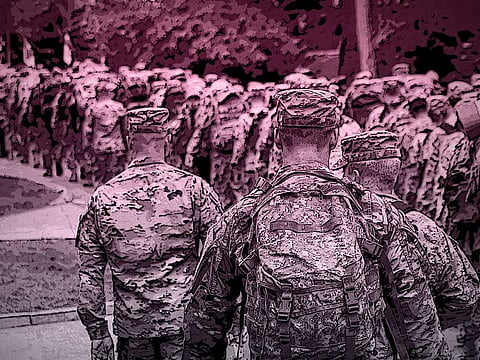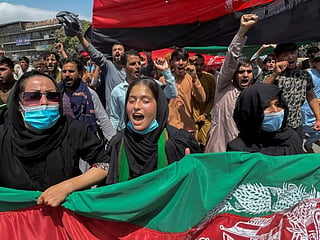How America’s War on Terror was corrupt from the start
The War in Afghanistan was a massive success for those who made a huge fortune off it

The war in Afghanistan wasn’t a failure. It was a massive success — for those who made a fortune off it.
Consider the case of Hikmatullah Shadman, who was just a teenager when American Special Forces rolled into Kandahar on the heels of Sept. 11.
They hired him as an interpreter, paying him up to $1,500 a month — 20 times the salary of a local police officer. By his late 20s, he owned a trucking company that supplied US military bases, earning him more than $160 million.
If a small fry like Shadman could get so rich off the war on terror, imagine how much Gul Agha Sherzai, a big-time warlord-turned-governor, has raked in since he helped the CIA run the Taliban out of town.
His large extended family supplied everything from gravel to furniture to the military base in Kandahar. His brother controlled the airport. Nobody knows how much he is worth, but it is clearly hundreds of millions.
Look under the hood of the “good war,” and this is what you see. Afghanistan was supposed to be an honourable war to neutralise terrorists. It was supposed to be a war that America should have won, had it not been for the distraction of Iraq, and the hopeless corruption of the Afghan government. But let’s get real. Corruption wasn’t a design flaw in the war. It was a design feature. We didn’t topple the Taliban. We paid warlords bags of cash to do it.
As the nation-building project got underway, those same warlords were transformed into governors, generals and members of Parliament, and the cash payments kept flowing.
No intention to govern
“Westerners often scratched their heads at the persistent lack of capacity in Afghan governing institutions,” Sarah Chayes, a former special assistant to US military leaders in Kandahar, wrote recently in Foreign Affairs. “But the sophisticated networks controlling those institutions never intended to govern. Their objective was self-enrichment. And at that task, they proved spectacularly successful.”
Instead of a nation, what we really built were more than 500 military bases — and the personal fortunes of the people who supplied them. That had always been the deal.
In April 2002, Defence Secretary Donald Rumsfeld dictated a top-secret memo ordering aides to come up with “a plan for how we are going to deal with each of these warlords — who is going to get money from whom, on what basis, in exchange for what, what is the quid pro quo, etc.”
The war proved enormously lucrative for many Americans and Europeans, too. One 2008 study estimated that some 40 per cent of the money allocated to Afghanistan actually went back to donor countries in corporate profits and consultant salaries.
Only about 12 per cent of US reconstruction assistance given to Afghanistan between 2002 and 2021 actually went to the Afghan government. Much of the rest went to companies like the Louis Berger Group, a New Jersey-based construction firm that got a $1.4 billion contract to build schools, clinics and roads. Even after it got caught bribing officials and systematically overbilling taxpayers, the contracts kept coming.
“It’s a bugbear of mine that Afghan corruption is so frequently cited as an explanation (as well as an excuse) for Western failure in Afghanistan,” Jonathan Goodhand, a professor in Conflict and Development Studies at SOAS University of London, wrote me in an email. Americans “point the finger at Afghans, whilst ignoring their role in both fuelling and benefiting from the patronage pump.”
Who won the war on terror?
American defence contractors, many of which were politically connected companies that had donated to George W. Bush’s presidential campaign, according to the Center for Public Integrity, a non-profit that has been tracking spending in a series of reports called the Windfalls of War. One firm hired to help advise Iraqi ministries had a single employee — the husband of a deputy assistant secretary of defence.
For George W. Bush and his friends, the wars in Iraq and Afghanistan achieved a great deal. President Bush got a chance to play a tough guy on TV. He became a wartime president, which helped him win re-election. By the time people figured out that the war in Iraq had been waged on false pretences and the war in Afghanistan had no honourable exit plan, it was too late.
What stands out about the war in Afghanistan is the way that it became the Afghan economy. At least Iraq had oil. In Afghanistan, the war dwarfed every other economic activity.
Over two decades, the US government spent $145 billion on reconstruction and aid, and an additional $837 billion on war fighting, in a country where the G.D.P. hovered between $4 billion and $20 billion per year.
Imagine what ordinary Afghans might have done if they had been able to use that money for long-term projects planned and executed at their own pace. But alas, policymakers in Washington rushed to push cash out the door, since money spent was one of the few measurable metrics of success.
The money was meant to buy security, bridges and power plants to win “hearts and minds.” But the surreal amounts of cash poisoned the country instead, embittering those who didn’t have access to it, and setting off rivalries between those who did.
“The money spent was far more than Afghanistan could absorb,” concluded the special inspector general of Afghanistan’s final report. “The basic assumption was that corruption was created by individual Afghans and that donor interventions were the solution. It would take years for the United States to realise that it was fuelling corruption with its excessive spending and lack of oversight.”
The result was a fantasy economy that operated more like a casino or a Ponzi scheme than a country. Why build a factory or plant crops when you can get fabulously wealthy selling whatever the Americans want to buy?
The money fuelled the revolving door of war, enriching the very militants that it was meant to fight, whose attacks then justified a new round of spending.
Social scientists have a name for countries that are so reliant on unearned income from outsiders: “rentier states.” Since money flowed from foreigners instead of taxes, leaders were responsive to donors rather than their own citizens.
None of this is to say that the Afghan people don’t deserve support, even now. They do. But far more can be achieved by spending far less in a more thoughtful way.
What does the Taliban takeover say about the war? It proves that you cannot buy an army.
Once the money spigot turned off, how many stuck around to fight for America’s vision of Afghanistan?
Farah Stockman is a columnist and editor
The New York Times








